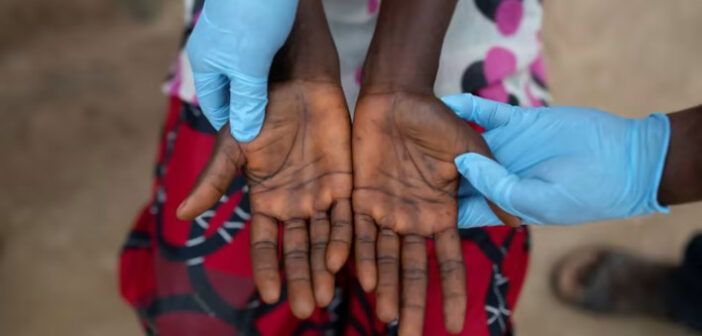The Canada-Africa Mpox Partnership has been established with the help of the Nigerian Institute of Medical Research NIMR, and other national stakeholders.
The purpose of the event was to stop the spread of measles and research the dynamics of human-to-human transmission.
According to the World health Organization, “Mpox ( formerly referred to as Monkeypox) is an illness caused by the Mpox virus. It is a viral zoonotic infection, meaning that it can spread from animals to humans. It can also spread from humans to other humans and from the environment to humans.”
The University of Ilorin, the Slum and Rural Health Initiative Network, the Institute Of Human Virology In Nigeria, and the Maryland Global Initiative Corporation are the other organisations involved in the project.
The Canadian Institutes of Health Research and the International Development Research Centre are collaborators on the initiative.
Prof. Babatunde Salako, Director-General of NIMR, stated during the occasion on Wednesday that the Nigeria consortium would collaborate with its Canadian colleagues to inform the clinical and public health response to regional and global measles epidemics.
The initiative, which will entail community involvement from the start, will be worked on by 68 researchers with multidisciplinary experience from Canada, Nigeria, the United States, and the United Kingdom, according to Salako.
The project is a partnership between the International Development Research Center and the Canadian Institutes of Health Research.
The Nigeria consortium will work with its Canadian counterparts to educate the clinical and public health response to regional and global measles epidemics, according to Prof. Babatunde Salako, Director-General of NIMR, who made the announcement during the event on Wednesday.
According to Salako, 68 researchers with varied backgrounds from Canada, Nigeria, the United States, and the United Kingdom will work on the program, which will involve community involvement from the outset.
“The good thing about this project is that it will provide the needed information for stakeholders in the project to understand transmission dynamics and evaluate medical countermeasures of Mpox in Nigeria and Canada.
“The stakeholders include not just researchers but also the communities who will be participating in the project.
“If at the end of the project, there is a very useful result, this can be translated in the communities to improve their health status,” he said.
But the D-G stressed once more the need for a medical research council to sponsor initiatives particular to Nigeria.
He said, “Many nations have agencies that fund health research directly but we don’t have that here in Nigeria and that is why health research appears to have been funded poorly.”
“The body funding the CAMP project is the Canadian Institute of Health Research; if we have such a body, we will be able to fund research on health issues that affect us directly.”
The project will concentrate on three areas across various epidemiological, geo-social, and health system contexts concerning Mpox transmission, treatment, and vaccinations, according to Prof. Rosemary Audu, the principal investigator of CAMP Nigeria.
The CAMP project’s two main focuses, according to Audi, who is also the Director of Research at NIMR, were community participation and multidirectional capacity building.
“In the first sub-project, CAMP researchers will work to understand transmission from multiple angles and the second sub-project will involve conducting a random contrail trial to access the safety and effectiveness of the smallpox drug tecovirimat as treatment for the disease.
” The third sub-project which is the last will focus on evaluating the role of immune vaccine to prevent Mpox infection in humans.
“We have also received ethical clearance from the National Health Insurance Ethics to commence field operation from April for 12 months period and we commend the Canadian institute for funding the project,” she said.
During the event, Dr. Evaezi Okpokoro, a public health physician with expertise in infectious diseases, also gave a presentation on the project’s work plan.
In contrast to the Canadian group, Okpokoro, who is also a researcher at the Institute of Human Virology, stated that the scientists would look into the transmission method.
The CAMP Nigeria team, he continued, will collaborate in building regional capability in areas such as quick clinical trials, biostatistics, and mathematical remodelling, all of which would be helpful in addressing future infectious disease issues.




